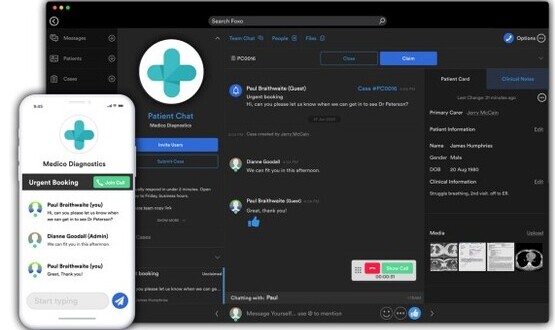What Matt Hancock got right – and wrong – about the pager purge
- 5 March 2019

No one could disagree with Matt Hancock’s contention that the pager is an outdated pieces of technology. But Joost Bruggeman fears a blanket ban on their use in the NHS is a blunt tool – one which indicates a lack of frontline understanding and a disjointed national strategy unlikely to encourage innovation.
Matt Hancock’s announcement the NHS must purge the pager by 2021 is being met with cynicism and, in some instances, anger from those across the frontline NHS. Healthcare professionals of all disciplines are insistently arguing the secretary of state hasn’t taken into account the significant issues that ditching pagers in favour of ‘WhatsApp-style’ messaging solutions brings.
When making his decision, they ask, did the secretary of state consider the wifi blind spots present in almost every hospital? The intrusiveness of mobile phones ringing in a patient care environment? The prospect of NHS staff having the lines between their personal and work life communications blurred? Or even the fact that the pager is considered a staple of every medic’s life?
I still remember being given my first pager as a surgeon. It was almost a badge of honour after finishing years of medical school – it signalled that I was working in real frontline care, to support health and care professionals and patients whenever they needed me.
But over time, things changed. Or, rather, technology did. We started to demand and expect more from it – especially with the introduction of smartphones.
From one frustration to another
The pager did its job, but I began to rely more and more on my phone to communicate work-related information. It just seemed like common sense: it becomes tiresome responding to all pages with the same level of urgency, and it becomes frustrating that you can’t send and receive detailed information.
Before I knew it, I was using my phone for less-urgent communications – as a type of hotline-to-peer forum. However, I soon found myself growing frustrated again as those same peers would contact me out of hours and disrupt my home life.
This sort of thought process is typical of so many medical professionals that I work with. It’s most likely why WhatsApp has become so extensively used in the NHS alongside pagers.
Despite being insecure, limited in functionality and unfit for purpose, WhatsApp is efficient, clinically useful and freely available. What’s more, it enables at least some information to be shared across geographical or organisational boundaries and networks – in ways not dissimilar to fax machines, pagers or postman. That’s something that many new digital systems, including electronic patient records systems and even NHSmail, still cannot do.
But now more appropriate solutions do exist, especially if we look beyond the NHS to countries like the Netherlands and Germany. Here, free secure healthcare messaging solutions are already in use, driven by grassroots demand. Notably, they are used alongside pagers – which are still being employed for emergency communications in non-wifi areas.
Right aims, wrong approach
Matt Hancock’s announcement is right in so many ways. But it is his approach that has upset so many. Not only is there no funding and a limited strategy, but the pager ban is one of a series of headline-grabbing announcements made in quick succession that puts a moratorium on technologies that have been ingrained in the NHS for decades. Indeed, those who had already started to make provisions based on the #axethefax announcement back in December now have to find something that will replace pagers.
Staggering the banning orders and announcements in this way not only projects a disjointed strategy but also means the NHS ends up trying to solve each problem in isolation. This risks bombarding staff with multiple tech solutions – overwhelming, confusing and hampering the workforce instead of helping it.
More often than not, we don’t need to to ban things innovate – we just need to show people better alternatives. In the consumer world, email is in rapid decline not because it is being banned but because there are other effective, efficient solutions that are readily available and are used out of choice.
So if Mr Hancock or his advisors are reading – we appreciate the passion, the direction and the commitment. But can we have more engagement within the NHS; perhaps even crowdsourcing of opinion? And equally important, could we have a directive announced – as part of a wider strategy – that enables the NHS to implement and develop more adaptable, multi-functional technology? That’s the best way in which we can build a future-proof healthcare system with a more efficient, mobile workforce.
Joost Bruggeman is a former surgeon and the co-founder of Siilo




6 Comments
WiFi blackspots are surely easily fixed with a WAP and work-life balance restored by having a dedicated NHS smart phone to replace a pager?
Why does an alternative to a pager need to be secure? Traditionally the only messages pagers carried were “ring extension 1234” or “crash team to ward 17?” If there’s no PID involved, surely there’s no need to be secure? If PID is involved – why not use Whatsapp, iMessage or Telegram! Many regimes are trying to ban these because they are end to end encrypted. Yes recipients can pass this on to third parties but that applies to NHSmail and snailmail etc too.
The fact is that Whatsapp has been the de facto mainstay of the NHS for years – whether we like it or not. Apparently it was invaluable during the Grenfell disaster and I’m guessing in other major disasters where conventional lines of communication were overwhelmed.
Paging systems are expensive though, probably due to the fact the NHS is likely the only customer MultiTone etc have!
Why NHS Digital can’t employ a couple of coders to design a WhatsApp-esque app is beyond me. That app could be secure and free to NHS personnel.
No need to worry Hancock’s got Chris Grayling organising it!
Yes, absolutely Ewan.
I thought I’d signed off with my name and title, will go amend that now.
Do you have any connection with Everbridge Philip?
Ewan
Totally agree that is appears to be a “do this” approach without any general guidance. The NHS is antiquated in many ways and it too often seems that a guiding hand is just not available……
Comments are closed.